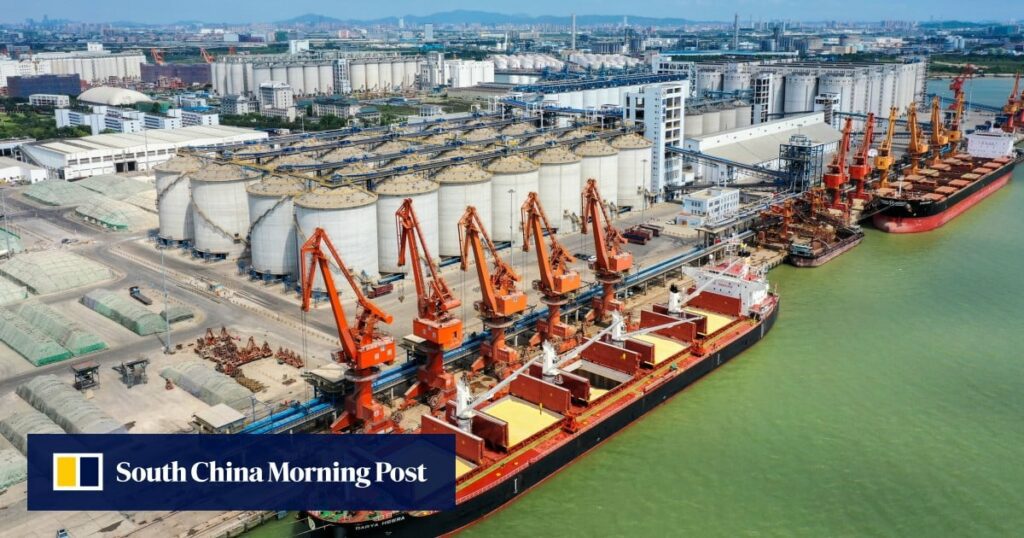Resource-rich African countries have seen heavy investment from Chinese companies as they ramp up mineral production amid the global push for green energy. One such country is Zimbabwe, a major source of lithium, which has had an influx of billions of dollars worth of investments and acquisitions from China in the Asian giant’s push to dominate the lithium-ion battery market.Similarly, the Democratic Republic of the Congo (DRC), which is the world’s largest producer of cobalt and a major source of copper, remains a major source of materials for China’s electric vehicle battery industry. China also imports minerals such as bauxite from Guinea and oil from Nigeria, Angola, Gabon and Ghana.
China’s largest trading partner in Africa is South Africa. In the first half of the year, the value of that trade hit US$27.5 billion, according to Chinese customs data.
During that period, imports from South Africa rose 10.7 per cent to US$17.29 billion year on year, but Chinese exports to the African nation fell 18.6 per cent to US$10.2 billion.
South Africa’s exports to China are mainly minerals and metals, but more recently China has started buying products such as soybeans, wine, rooibos tea, aloe vera gel and citrus fruits.
Later this year, avocados will join that list after the two countries signed a deal at the Brics summit in Johannesburg last year.
“China stands ready to speed up the process so that avocados from South Africa will be enjoyed by the Chinese people as soon as possible,” Chinese ambassador to South Africa Wu Peng wrote on X on Wednesday.
Avocados are set to join South Africa’s list of exports to China after a deal was agreed to at the Brics summit last year. Photo: XinhuaThe deal comes amid Beijing’s plan to diversity its food and agricultural trade and reduce its dependencies on countries like the US and Australia. China is importing more food products from Africa as a result – avocados from Kenya and Tanzania, fruit from South Africa and Zimbabwe, coffee from Ethiopia and chillies from Rwanda. It has signed trade deals with dozens of African countries, waiving tariffs on 98 per cent of the taxable items originating from those nations.China’s trade with Africa appeared to buck the general trend, with China recording an overall increase in exports. In June, exports grew at their fastest in over a year, rising 8.6 per cent that month, while imports shrank 2.3 per cent to hit a four-month low in June, amid a weak domestic demand caused by the property crisis and slowing economy.
Regarding the African exports to China, Mark Bohlund, a senior credit research analyst at REDD Intelligence, said higher copper prices are one factor in the increased figures.
“Higher production volumes are also playing a part,” he said.
“The depreciation of the Nigerian naira, and to a lesser extent, the South African rand and Kenyan shilling, have likely played in to reduce Chinese exports given that these are the largest markets in sub-Saharan Africa.”
But, he said, African exports to China would probably weaken somewhat in the second half of the year, mainly due to lower copper exports.
02:03
Chinese-made electric vehicles face additional EU import tariffs of up to 38%
Chinese-made electric vehicles face additional EU import tariffs of up to 38%
While copper prices slumped as a result of the coronavirus pandemic and the slowdown in the Chinese economy, the price recently rallied to reach an all-time high in May of about US$10,900 per tonne, breaking its previous record of US$10,845 per tonne in March 2022. The price has dipped a little since May’s record high but remains strong at more than US$9,500 per tonne.
“I expect growth in Chinese exports to Africa to remain relatively weak as growth in Nigeria and South Africa is likely to remain weak in the near term,” Bohlund added.
Charlie Robertson, head of macro strategy at asset management firm FIM Partners, said Chinese exports to Africa may have dropped because of the big currency devaluations in Egypt, Nigeria and Ghana, foreign currency restrictions in Ethiopia, and austerity measures in Kenya and other countries.
For Africa to service its debt to China, he said it needed a trade surplus, not a trade deficit.
“How else can Africa earn the dollars it needs to repay China?” Robertson said. “A shrinking trade deficit is heading in the right direction, but really we want to see the opposite of the export and import totals in China and Africa’s trade.”
Unfortunately, he said, China prioritised its own profit from Africa at every level of engagement – in its exports to Africa, lending to Africa, and by making a requirement of those loans the use of Chinese companies to build infrastructure and supply goods.
“As China’s big priority right now is exporting its way out of its domestic property slump, I would expect it to try to boost exports to Africa over the coming year,” Robertson said.
Source link : https://www.scmp.com/news/china/diplomacy/article/3271075/africas-trade-deficit-shrinks-exports-china-surge-experts-say-it-wont-last
Author :
Publish date : 2024-07-20 13:00:11
Copyright for syndicated content belongs to the linked Source.
